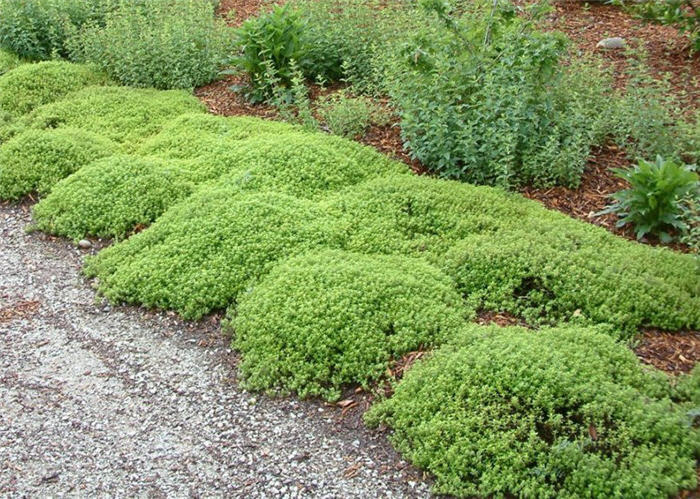| Botanical Name: Thymus x citriodorus | |
| Common Name: Lemon Thyme |

-
Anatomy
-
Culture
-
Design
Plant Type
Perennial, Herb
Height Range
Under 1'
Flower Color
Pink
Flower Season
Spring
Leaf Color
Dark Green
Bark Color
n/a
Fruit Color
n/a
Fruit Season
n/a
Sun
Full
Water
Low, Medium
Growth Rate
Moderate
Soil Type
Sandy, Clay, Loam
Soil Condition
Average, Poor, Well-drained, Dry
Soil pH
Neutral
Adverse Factors
Attracts Bees
Design Styles
English Cottage, Mediterranean, Ranch, Spanish
Accenting Features
Fragrance, Showy Flowers, Unusual Foliage
Seasonal Interest
Spring, Summer, Fall
Location Uses
Entry, Perennial Border, Parking Strip, Patio, Raised Planter, Walkways, With Rocks
Special Uses
Container, Cut Flowers, Small Spaces
Attracts Wildlife
n/a
Information by: Stephanie Duer
Photographer:
Photographer:
-
Description
-
Notes
This thyme is primarily grown as an herb, for it's rich, lemony scent. Lemon thyme grows up to 12 inches tall and 12 to 18 inches wide; it's height makes it a poor choice as a lawn alternative, but its toughness and scent make it well suited to the sides of paths and walks. Tiny leaves are deep green, and the flowers, which appear in late spring, are pale lilac. Both the leaves and flowers are edible.
Grow in well drained soil in full sun; prefers a sandy-loamy soil, but will grow in clay soil that has been amended. The plant can get a little woody, and so cut back the stems as necessary to keep tidy or encourage new foliage. To use, snip stems off, and either bundle them up and toss them in the pot (and fish out the woody stems later) or strip the leaves off and use. Though thyme may be dried, its flavor is so much better and brighter when used fresh. Use the flowers as garnish for salads or other dishes.